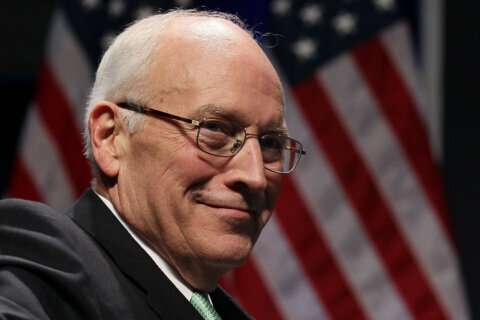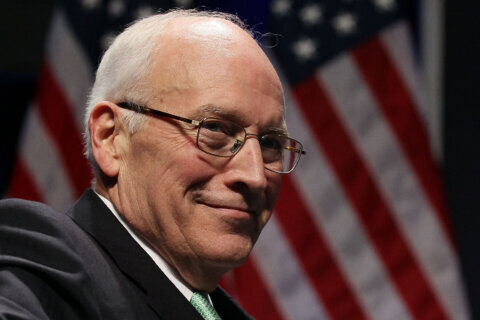-
 play_arrow
play_arrow
Praise 24/7 NO Today's Best Gospel
Dick Cheney, America’s Most Powerful Modern Vice President, Dies at 84.

(ThyBlackMan.com) Dick Cheney, who once stood as one of the most formidable and controversial figures in modern American politics, has died at the age of 84. Known as the driving force behind many of the most consequential national security decisions of the early 21st century, Cheney’s influence as vice president under George W. Bush reshaped the American presidency, foreign policy, and the Republican Party itself. His death, confirmed by his family, marks the end of a political era defined by power, secrecy, and the aftermath of war. Cheney’s family said he passed surrounded by loved ones due to complications of pneumonia and cardiac and vascular disease. They described him as “a great and good man,” devoted to his wife Lynne, his daughters Liz and Mary, and his seven grandchildren. The family’s tribute portrayed a man of love, faith, and service, words that will ring differently for admirers and critics alike.

Cheney’s political life cannot be understood without acknowledging the dual nature of his legacy. To his supporters, he embodied steadiness and resolve in the face of unimaginable crisis following the September 11, 2001 attacks. To his detractors, he symbolized the dark side of American power—the architect of wars founded on questionable intelligence, a man who justified torture in the name of national security, and one who expanded executive power beyond what the framers of the Constitution could have imagined. His life was one of deep contradictions: a family man and devout patriot whose vision of America’s place in the world led to years of turmoil abroad. Few men in Washington ever commanded so much influence behind closed doors, and even fewer left such a contentious trail of consequences in their wake.
Born Richard Bruce Cheney on January 30, 1941, in Lincoln, Nebraska, and raised in Casper, Wyoming, Cheney’s early years gave little hint of the titan he would become. He was an average student, eventually flunking out of Yale before finding direction through the influence of his future wife Lynne Vincent, whom he met in high school. She pushed him to abandon a life of odd jobs and hard living and to pursue something greater. He returned to the University of Wyoming, earning both a bachelor’s and a master’s degree in political science. The lessons of Wyoming—discipline, quiet determination, and loyalty—would serve him throughout a career defined by patience and persistence rather than charisma or spectacle. Cheney’s demeanor was never that of a showman. He was an operator, a strategist, a man comfortable in the shadows where real decisions were made.
Cheney’s first steps into Washington came under the mentorship of Donald Rumsfeld during the Nixon and Ford administrations. By his mid-thirties, he was already serving as White House chief of staff under President Gerald Ford, mastering the levers of bureaucratic power. After Ford’s defeat, Cheney returned to Wyoming, successfully running for Congress in 1978. During six terms in the House of Representatives, he became known for his conservative instincts and deep understanding of defense policy. He opposed sanctions on apartheid South Africa, voted against the establishment of the Department of Education, and supported Reagan’s military buildup. His experience made him a natural fit for President George H. W. Bush’s Secretary of Defense in 1989, where he directed the successful military operations in Panama and the Gulf War. It was this steady command that earned him bipartisan respect and solidified his reputation as a man who knew how to wield the Pentagon’s power effectively and efficiently.
After leaving the Pentagon, Cheney entered the private sector as CEO of Halliburton, an energy and defense contractor. The move was lucrative, and it placed him at the nexus of corporate and political influence. When George W. Bush sought a running mate in 2000, Cheney was initially tasked with leading the search. But Bush eventually concluded that Cheney himself was the most qualified choice. It was a fateful decision that would alter the course of American history. While Bush brought the personality, Cheney brought the experience. Once in office, Cheney quickly became the most powerful vice president in U.S. history. Traditionally a ceremonial role, Cheney transformed the office into a command center for national security and foreign policy. Those close to the Bush administration often remarked that Cheney was not simply the second-in-command; he was a co-president in all but name.
The attacks of September 11, 2001, became the crucible that defined Cheney’s vice presidency. As the twin towers fell, Cheney was in a secure underground bunker beneath the White House. From there, he made decisions that would reverberate for decades, including authorizing the military to shoot down hijacked planes if necessary. That day transformed Cheney from a cautious conservative into a hardened warrior against terrorism. He was determined to ensure that America would never again be caught unprepared. In the aftermath, Cheney helped craft the Bush Doctrine, which asserted America’s right to strike preemptively against perceived threats. This philosophy would justify wars in Afghanistan and Iraq, the expansion of surveillance, and the establishment of detention centers like Guantanamo Bay. It was a vision rooted in the belief that strength and secrecy were essential to survival, even if they came at the expense of civil liberties.
Cheney’s influence in pushing for the Iraq War remains the most controversial chapter of his career. He publicly warned of Saddam Hussein’s supposed weapons of mass destruction and alleged links to al-Qaeda, statements that later proved false. When no weapons were found, Cheney defended his position by arguing that the intelligence community had simply gotten it wrong, not that the administration had misled the public. To this day, historians debate how much Cheney and others in the Bush administration knew—or wanted to believe—when they made their case for war. The invasion of Iraq in 2003 toppled Hussein but unleashed years of chaos and insurgency that cost thousands of American lives and hundreds of thousands of Iraqi ones. Cheney never apologized. “It was the right thing to do,” he said repeatedly. To him, leadership meant making hard decisions and living with their consequences.
Cheney’s insistence on aggressive interrogation tactics—methods that human rights organizations and even America’s own Senate Intelligence Committee later labeled as torture—cemented his reputation as a man unmoved by public opinion. He argued that waterboarding and other harsh techniques were essential to saving American lives. “I’d do it again in a minute,” he told reporters when confronted years later. His unapologetic stance reflected a worldview that saw moral compromise as a necessary cost of security. This same outlook guided his belief in the so-called “unitary executive theory,” which held that the president should have broad, nearly unchecked powers in matters of national defense and foreign policy. Cheney viewed the post-Watergate reforms that limited presidential authority as a mistake, believing that they weakened America’s ability to act decisively on the world stage. In many ways, he spent his vice presidency trying to reverse those limitations.
While Cheney’s influence during the Bush years was immense, his relationship with the president grew strained over time. As Bush’s confidence grew, especially during his second term, he increasingly overruled his vice president. Bush resisted Cheney’s push for more aggressive actions in Iran and North Korea and refused to pardon Cheney’s former chief of staff, Scooter Libby, after his conviction for perjury and obstruction of justice. The two men’s once-symbiotic partnership cooled, though Cheney’s respect for Bush’s leadership remained public. Yet, behind the scenes, he viewed Bush’s moderation as a retreat from principle. When Barack Obama succeeded Bush in 2009, Cheney became one of Obama’s fiercest critics, accusing him of weakening America’s defenses by ending torture programs and pledging to close Guantanamo Bay. For the next several years, Cheney served as the conservative movement’s uncompromising voice, warning that Democrats were endangering the republic by showing softness toward terrorism.
Cheney’s post-White House years were also defined by his struggle with heart disease, a battle that began with his first heart attack at age 37. Over the years, he would suffer several more, undergo multiple surgeries, and eventually receive a heart transplant in 2012. The experience humanized a man long caricatured as cold and calculating. In interviews, he described the transplant as “the gift of life itself.” Despite his frail health, Cheney continued to speak publicly, write books, and remain active in political debates. He co-authored a memoir with his daughter Liz titled “Exceptional: Why the World Needs a Powerful America,” a work that defended his worldview and argued that the United States must never hesitate to use its strength in defense of freedom.
But as the Republican Party changed, so too did Cheney’s place within it. The rise of Donald Trump in 2016 represented everything Cheney distrusted: populism over principle, emotion over policy, and personal loyalty over institutional respect. Though he initially offered cautious support for Trump’s presidency, Cheney grew increasingly alarmed by his disregard for constitutional norms. The breaking point came after the January 6, 2021, attack on the Capitol. Cheney and his daughter Liz, then a congresswoman from Wyoming, condemned Trump in the strongest terms. Liz Cheney would go on to serve as vice chair of the House committee investigating the insurrection, sacrificing her career in Republican politics to do so. Her father stood firmly beside her. In a campaign ad defending her re-election, Cheney appeared on camera wearing a cowboy hat and declared, “In our nation’s 246-year history, there has never been an individual who is a greater threat to our republic than Donald Trump.” His words were a stunning rebuke from a lifelong conservative who had spent decades defining the Republican establishment.
Cheney’s endorsement of Kamala Harris in the 2024 election was the final shock in a career filled with them. He said his decision was not about ideology but about preserving democracy itself. “There comes a time when you must put country above partisanship,” he explained. The endorsement alienated him from what remained of his allies in the GOP but earned him praise from Democrats who once despised him. It was a testament to the strange political realignment that had taken place since the Bush years. Cheney, once the face of Republican power, had become a symbol of resistance to the very party he helped build. In that sense, his later years mirrored the arc of American conservatism itself—from the disciplined realism of the Cold War to the populist fervor of the Trump era.
Even as his health deteriorated, Cheney continued to reflect on the nature of leadership and responsibility. He told interviewers that he did not believe history would ever fully vindicate him, but that was never his goal. “I did what I believed was right,” he often said. His legacy is therefore not one of redemption but of conviction. Few men have shaped modern American policy as profoundly. From his office in the West Wing, he redefined the vice presidency into a position of extraordinary reach. His doctrines of preemption and executive authority still echo in Washington’s corridors of power. Yet for all his influence, Cheney was not a man who sought the spotlight. He preferred the corridors of command, the private briefings, the classified memos. Power, to Cheney, was a tool to be used, not flaunted.
In the final years of his life, as he attended public events with his daughter or made rare appearances in interviews, Cheney seemed at peace with his reputation. He knew he would never be universally admired, but he also knew he had made an indelible mark. Whether seen as a patriot who defended America in its darkest hour or as the architect of wars that eroded its moral authority, Dick Cheney’s life remains a study in the complexities of power. His brand of conservatism—disciplined, hawkish, unapologetic—may no longer define the Republican Party, but it defined an era. His passing closes the chapter on a generation of leaders who believed that America’s might, not its humility, was its greatest virtue.
Dick Cheney is survived by his wife Lynne, his daughters Liz and Mary, and seven grandchildren. His family’s statement emphasized his love of country, family, and the outdoors, particularly his passion for fly fishing. It is a gentle image of a man whose public persona was anything but gentle. Yet perhaps it is fitting. For all the policies, wars, and controversies that bore his fingerprints, Cheney, in the end, remained what he always had been—a man of principle and iron resolve, certain that history would judge him as he judged himself: as one who served without apology.
Staff Writer; L.L. McKenna
Politics explained through the lens of justice and equity. Offering perspective that informs, challenges, and empowers.
One can contact this brother at; LLMcKenna@ThyBlackMan.com.
Written by: Black Gospel Radio
Similar posts
-

Praise 24/7 Commercial Free
For every Show page the timetable is auomatically generated from the schedule, and you can set automatic carousels of Podcasts, Articles and Charts by simply choosing a category. Curabitur id lacus felis. Sed justo mauris, auctor eget tellus nec, pellentesque varius mauris. Sed eu congue nulla, et tincidunt justo. Aliquam semper faucibus odio id varius. Suspendisse varius laoreet sodales.
close Top popular

The Science of Happiness – Exploring Factors for Well-Being

Balancing Act: Prioritizing Your Well-Being in a Busy World

Overcoming Procrastination – Strategies for Productivity and Success

Unlocking Hidden Potential – A Guide to Personal Growth

Mindful Living – Cultivating Presence in the Modern Era

CONTACT US
- info@praise247no.com
FOLLOW US
- Praise247NO
- Praise247NO
- Praise247NO
Copyright 2024 Praise247no.com - All Rights Reserved.




Post comments (0)